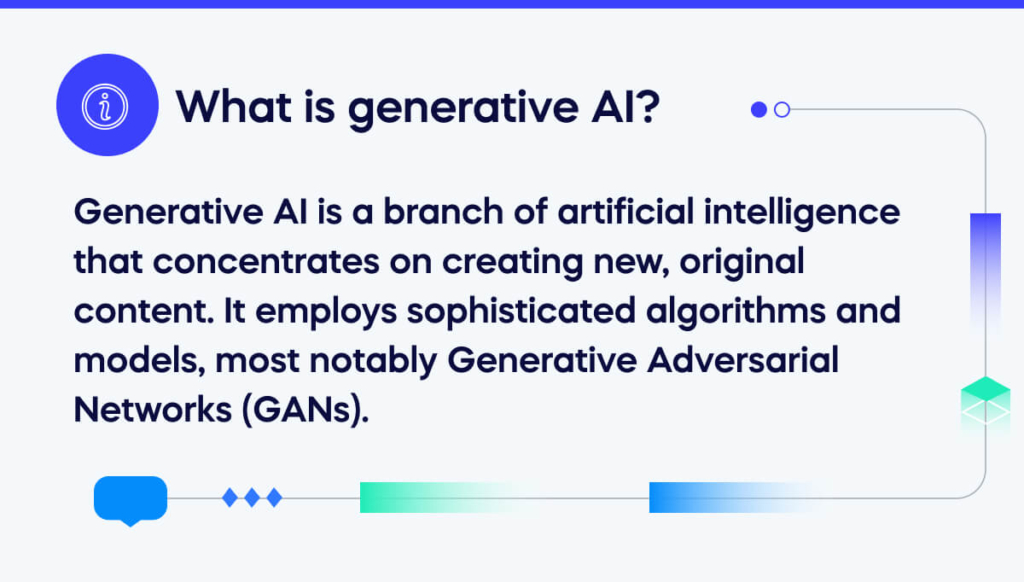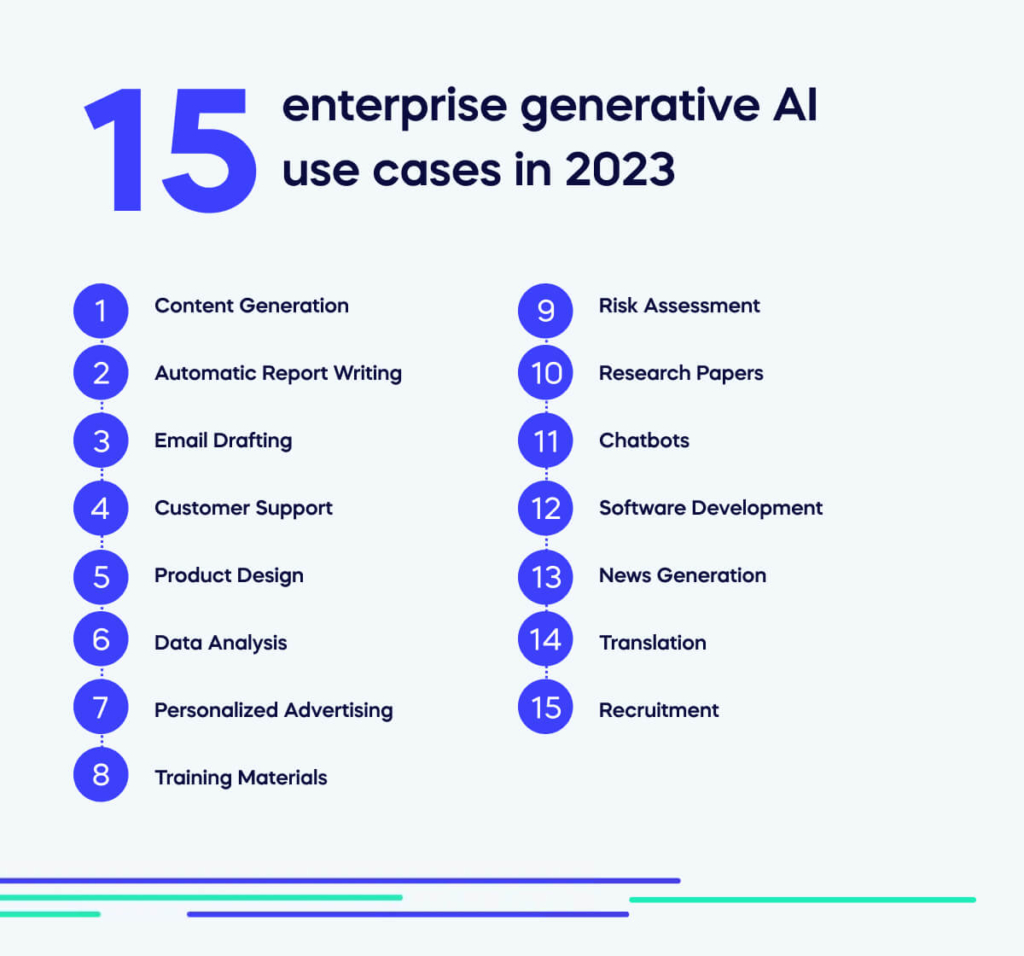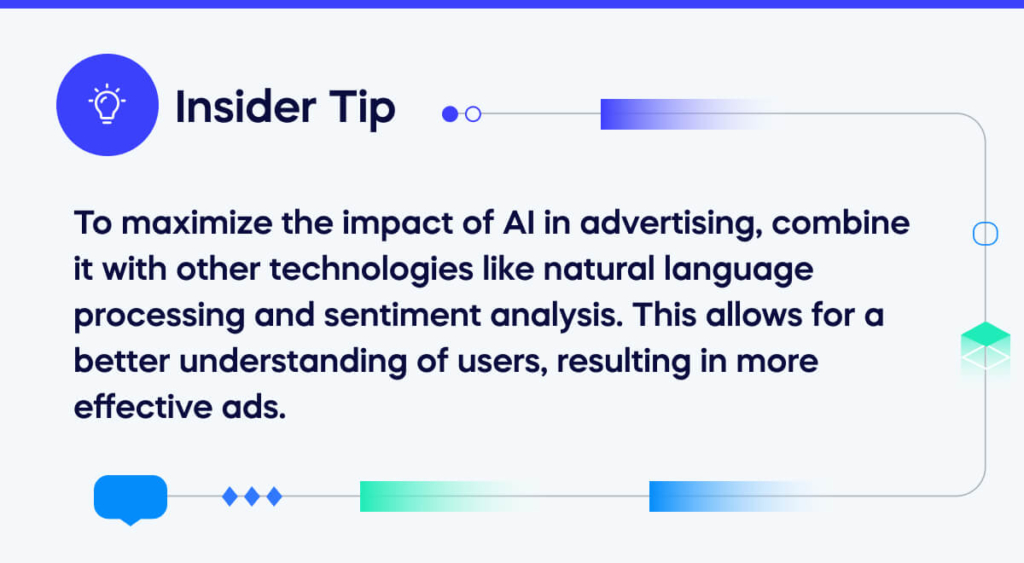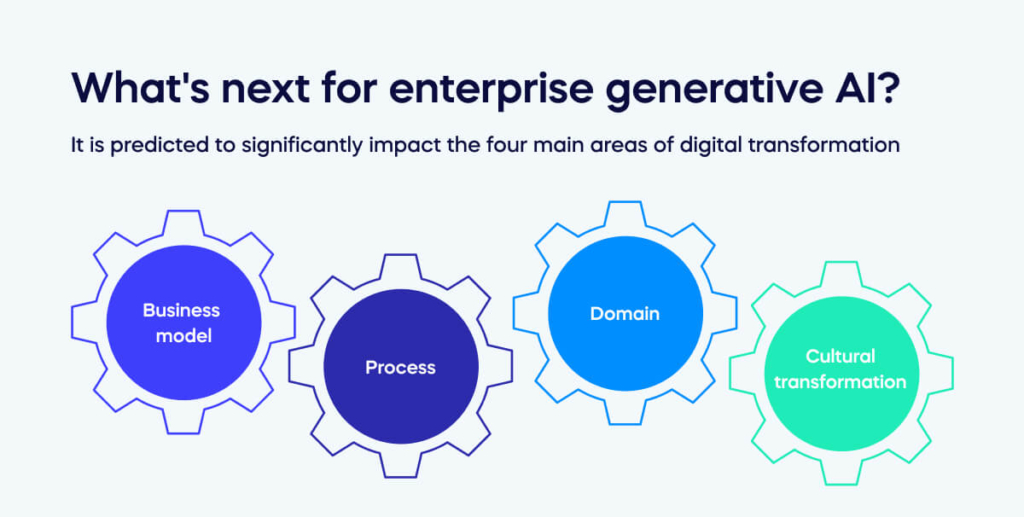As we stand on the precipice of 2023, a dramatic shift is taking place in the realm of enterprise technology.
According to McKinsey, Generative AI holds the power to revolutionize the landscape of work, enhancing the abilities of individual workers by automating certain activities. This transformative technology has the potential to reshape the very fabric of work, empowering individuals to achieve more while preserving the essence of their contributions.
The future is not merely digital; it is being actively shaped by the powerful capabilities of generative Artificial Intelligence (AI). This advanced subset of AI has moved beyond theoretical discussions and into the concrete world of enterprise applications, transforming how businesses operate, innovate, and compete.
Generative AI, an avant-garde technology that harnesses algorithms to create everything from written content to complex design models, is no longer a nascent concept. It’s here, and its potential to revolutionize industries is immense. Companies leverage generative AI to automate tasks, improve processes, and foster innovation, effectively reshaping the enterprise landscape.
The use cases for this cutting-edge technology are diverse and span across sectors. From automating content creation in media and advertising to optimizing supply chains in logistics, generating hyper-personalized user experiences in retail, and even accelerating drug discovery in healthcare – generative AI is proving to be a game-changer.
This article will delve deeper into the future of enterprise generative AI. We’ll explore real-world use cases, identify key benefits, and provide a roadmap for businesses looking to navigate this exciting frontier in 2023. Welcome to the future – where enterprise generative AI is not just a tool but a strategic partner in driving business success.
What is generative AI?

Generative AI is a branch of artificial intelligence that concentrates on creating new, original content. It employs sophisticated algorithms and models, most notably Generative Adversarial Networks (GANs).
These networks consist of two parts: a generator, which creates new data instances, and a discriminator, which evaluates them for authenticity; they work together to improve the quality of outputs. The technology can generate various outputs, ranging from images and text to music and even voice synthesis.
Its ability to mimic human-like creativity has significant implications for various industries, such as entertainment, design, and advertising, offering innovative ways to automate and enhance creative processes.
What is enterprise generative AI?
Enterprise Generative AI refers to the utilization of artificial intelligence technology in a corporate or business environment. In this context, the AI can create various forms of content, such as text, code, voice, images, videos, processes, and even more intricate forms.
Enterprise Generative AI has a wide range of applications. It excels in generating lifelike images, captivating animations, and immersive audio for graphic design and video marketing endeavors. It is proving to be an invaluable asset for streamlining administrative tasks, including claims processing, appointment scheduling, and overall operational management. Its versatility and efficiency make it an indispensable tool in various industries.
The development and use of enterprise-ready generative AI models are rising and have been incorporated into platforms like Google Cloud’s Vertex AI. As these technologies continue to evolve, business leaders are finding that generative AI solutions can drive their organizations to previously unattainable speeds and scales of execution.
Generative AI is transforming the enterprise landscape, providing increased efficiency, creativity, and scalability opportunities.
15 enterprise generative AI use cases in 2023

You might be surprised at the sheer breadth of potential applications for generative AI in the enterprise world.
Here are 15 use cases that will likely become mainstream over the next few years:
Content Generation
In the digital age, content is king. Generative AI can play a crucial role in creating diverse and engaging content for various digital platforms. Leveraging natural language processing (NLP) and machine learning, it can generate unique, SEO-friendly content such as product descriptions, blog posts, and social media updates.
The AI can learn from past data and understand trends, allowing it to optimize content for better engagement, higher click-through rates, and improved conversion. This can free up significant time for content creators, who can then focus on strategic tasks. Moreover, AI-generated content can be fine-tuned to appeal to different audiences, ensuring a personalized experience for each user.
Insider Tip: To get the most out of AI in content creation, you should feed high-quality data. The AI will learn from this data to produce better content. Regularly testing and refining the AI’s outputs is also important to maintain quality and relevance.
Automatic Report Writing
The process of report writing can be tedious and time-consuming. Generative AI can revolutionize this by automating the task completely. Using advanced algorithms, it can accurately analyze raw data, identify key trends, and generate comprehensive reports in an easily digestible format.
This saves time and ensures consistency and accuracy in reporting, eliminating human errors. Additionally, the AI can learn from feedback, continually improving its performance. This capability can be particularly useful in fields like finance, where timely and accurate reporting is critical.
Insider Tip: Consistently review and fine-tune the parameters set for report generation. Ensure the AI understands the context of the data to produce meaningful reports.
Email Drafting
Communication is at the heart of every business. Generative AI can enhance this communication by drafting emails efficiently and effectively. NLP can understand the context, generate appropriate responses, and even suggest improvements, ensuring effective communication.
It can also automate routine emails, freeing up time for more critical tasks. This ability can be extended to other forms of written communication, such as memos, newsletters, and company announcements, making AI a valuable tool in the modern workplace.
Insider Tip: For effective email marketing with AI, segment your audience based on demographics, behavior, and preferences. This allows the AI to generate personalized emails that resonate with each segment.
Customer Support
Customer satisfaction is paramount for any business. Generative AI can significantly enhance customer experience by providing instant, accurate support. Using NLP and machine learning, it can understand customer queries, generate accurate responses, and provide solutions. It can handle multiple queries simultaneously, reducing the workload of human agents and ensuring 24/7 support.
The AI can also learn from each interaction, improving its performance over time. This can lead to higher customer satisfaction, increased loyalty, and, ultimately, greater business success.
Insider Tip: When using AI for customer service, training the AI on your specific product or service and frequently updating it with new information is crucial. This ensures that AI can provide accurate and helpful responses to customer queries.
Product Design
Generative AI can bring about a paradigm shift in product design. Using generative design algorithms, the AI can explore all possible permutations of a solution, quickly generating design alternatives. It can optimize the design based on specified parameters such as cost, material, and manufacturing method.
This approach encourages innovation and allows the creation of previously unimaginable designs. Moreover, it can drastically reduce the time taken to move from concept to product, giving businesses a competitive edge.
Insider Tip: Invest in a generative design platform with powerful customization capabilities. This allows you to set parameters that best suit your product or service, ensuring an ideal design every time.
Data Analysis
In today’s data-driven world, extracting meaningful insights from large datasets is invaluable. Generative AI can transform the field of data analysis by using machine learning and statistical models to analyze data, identify patterns, and make predictions. It can generate actionable recommendations, enabling businesses to make data-driven decisions.
This can lead to improved business strategies, greater operational efficiency, and increased profitability. Moreover, AI can handle complex, multi-dimensional data, uncovering insights that human analysts might miss.
Insider Tip: To get the most out of AI in data analysis, you should regularly review and refine its parameters. This ensures that it generates accurate insights and provides meaningful recommendations to help businesses move forward.
Personalized Advertising
In the crowded digital advertising space, personalization is key to standing out. Generative AI can significantly enhance advertising effectiveness by personalizing ads based on user behavior and preferences. Using machine learning, it can analyze vast amounts of user data, identify trends, and generate tailored advertisements.
This improves engagement and increases the likelihood of conversions, resulting in a higher return on ad spend. Moreover, the AI can continuously learn and adapt, ensuring that the ads remain relevant and effective.

Insider Tip: To maximize the impact of AI in advertising, combine it with other technologies like natural language processing and sentiment analysis. This allows for a better understanding of users, resulting in more effective ads.
Training Materials
Training is a critical aspect of any organization. Generative AI can simplify and enhance employee training by generating customized training materials. It can analyze the learner’s needs, generate relevant content, and adjust the difficulty level to ensure effective learning. It can also update the materials based on the learner’s progress, providing a personalized learning experience.
This can lead to improved employee performance, job satisfaction, and retention rates. Moreover, AI can handle multiple learners simultaneously, making it a scalable solution for large organizations.
Insider Tip: Invest in an AI-driven training platform well integrated with other existing systems. This ensures smooth and seamless implementation of the AI, allowing you to make the most of its capabilities.
Risk Assessment
Risk management is a crucial aspect of any business. Generative AI can greatly enhance risk management by predicting potential risks and generating mitigation strategies. It uses predictive analytics to analyze historical and real-time data, identify risk factors, and estimate the likelihood of adverse events.
This proactive approach can help businesses prepare for potential threats and avoid costly mistakes. Moreover, AI can continuously monitor the risk landscape, alerting companies to changes and helping them stay one step ahead.
Insider Tip: When using AI for risk management, it’s important to have a detailed understanding of the underlying algorithms. This allows you to fine-tune the parameters and ensure that the AI generates accurate predictions and effective mitigation strategies.
Research Papers
Research is a fundamental part of academic and scientific progress. Generative AI can greatly assist researchers by drafting research papers. It can analyze vast amounts of data, extract key insights, and present them in a coherent, structured manner.
It can also generate references and citations, ensuring academic integrity. This can save researchers significant time and effort, allowing them to focus on their core research work. Moreover, AI can handle large, complex datasets, making it a valuable tool in genomics, climate science, and AI research.
Insider Tip: Invest in a research paper writing platform powered by cutting-edge AI technology. This ensures that the AI can generate high-quality papers quickly and accurately, helping researchers stay ahead of the curve.
Chatbots
In today’s digital age, customers expect instant, personalized service. Generative AI can meet these expectations by powering intelligent chatbots. These chatbots use NLP to understand customer queries, generate appropriate responses, and provide personalized recommendations.
With seamless handling of multiple queries, they guarantee 24/7 customer support. Moreover, their capacity to learn from each interaction fosters ongoing enhancements, leading to elevated customer satisfaction, unwavering loyalty, and remarkable business success.
Insider Tip: Regularly update your chatbot’s knowledge base with new information and frequently asked questions. This helps in improving the accuracy of its responses.
Software Development
Software development is a complex, time-consuming process. Generative AI can expedite this process by generating code. Using machine learning, it can understand coding patterns, generate efficient code, and even debug errors.
Not only does this streamline development time, but it also enhances software quality. The AI can handle multiple projects concurrently, making it a scalable solution for large software development firms.
Insider Tip: Keep your AI updated with the latest coding standards and practices. Also, use AI to automate testing, which can help identify bugs quicker.
News Generation
Journalism is a fast-paced, dynamic field. Generative AI can revolutionize journalism by generating news articles based on real-time data and events. It can analyze vast amounts of data, generate coherent narratives, and ensure timely reporting.
It can also adapt its writing style based on the target audience, enhancing reader engagement. This can lead to more informed readers, a more engaged public, and a stronger democracy.
Insider Tip: Pair your AI with a human editor to ensure accuracy and quality of reporting. This ensures that AI-generated news stories are original, accurate, and up-to-date.
Translation
In our increasingly globalized world, communication across languages is crucial. Generative AI can facilitate this by translating text from one language to another.
It can accurately and contextually translate text using machine translation techniques, handling multiple languages and dialects. This can facilitate cross-cultural communication, promote diversity, and foster global collaboration.
Insider Tip: Use an AI-powered translation platform optimized for different dialects. This ensures better accuracy and more natural translations, enabling effective cross-lingual communication.
Recruitment
Recruitment is a critical yet challenging aspect of any organization. Generative AI can streamline recruitment by automating various tasks. It can generate job descriptions, screen resumes based on specified criteria, and draft interview questions.
Using machine learning, it can predict candidate performance, helping recruiters make informed decisions. This can lead to better hires, reduced hiring time, and lower recruitment costs. Moreover, AI can handle multiple candidates simultaneously, making it a scalable solution for large organizations.
Insider Tip: Supplement the AI-driven recruitment process with manual steps like face-to-face interviews. This helps gauge soft skills and cultural fit, ensuring that the final hire matches the job and the organization.
What’s next for enterprise generative AI?

Generative AI is poised at a critical inflection point in the landscape of digital transformation and enterprise use. It is predicted to significantly impact the four main areas of digital transformation – business model, process, domain, and cultural transformation.
As enterprises continue integrating AI with their existing strategies, generative AI presents immense potential for reshaping business operations and roles.
McKinsey identified 63 generative AI use cases that span across 16 diverse business sectors, showcasing its wide-ranging applicability. These use cases encompass various areas such as content creation, product design, risk management, and predictive maintenance. This transformative technology enhances efficiency and fuels innovation by unlocking new avenues of creativity and problem-solving.
Looking ahead, the future of generative AI in enterprises seems promising. However, it will be crucial for businesses to foster a culture of learning and adaptability to leverage this technology fully. Additionally, employees can play a significant role in shaping the evolution of generative AI by actively participating in its development and application.
Generative AI holds immense potential for driving digital transformation in enterprises. As more businesses recognize its value and invest in its implementation, we can expect a significant shift in how companies operate and innovate.


